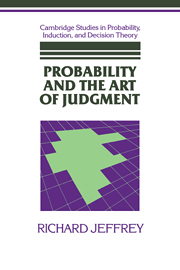Book contents
- Frontmatter
- Contents
- Preface
- 1 Introduction: Radical probabilism (1991)
- 2 Valuation and acceptance of scientific hypotheses (1956)
- 3 Probable knowledge (1968)
- 4 Probability and the art of judgment (1985)
- 5 Bayesianism with a human face (1983)
- 6 Alias Smith and Jones: The testimony of the senses (1987)
- 7 Conditioning, kinematics, and exchangeability (1988)
- 8 Preference among preferences (1974)
- 9 On interpersonal utility theory (1971)
- 10 Remarks on interpersonal utility theory (1974)
- 11 Mises redux (1977)
- 12 Statistical explanation vs. statistical inference (1969)
- 13 New foundations for Bayesian decision theory (1965)
- 14 Frameworks for preference (1974)
- 15 Axiomatizing the logic of decision (1978)
- 16 A note on the kinematics of preference (1977)
13 - New foundations for Bayesian decision theory (1965)
Published online by Cambridge University Press: 05 June 2012
- Frontmatter
- Contents
- Preface
- 1 Introduction: Radical probabilism (1991)
- 2 Valuation and acceptance of scientific hypotheses (1956)
- 3 Probable knowledge (1968)
- 4 Probability and the art of judgment (1985)
- 5 Bayesianism with a human face (1983)
- 6 Alias Smith and Jones: The testimony of the senses (1987)
- 7 Conditioning, kinematics, and exchangeability (1988)
- 8 Preference among preferences (1974)
- 9 On interpersonal utility theory (1971)
- 10 Remarks on interpersonal utility theory (1974)
- 11 Mises redux (1977)
- 12 Statistical explanation vs. statistical inference (1969)
- 13 New foundations for Bayesian decision theory (1965)
- 14 Frameworks for preference (1974)
- 15 Axiomatizing the logic of decision (1978)
- 16 A note on the kinematics of preference (1977)
Summary
Aristotle makes some use of the ordinal notion of utility or desirability in his account of deliberation, e.g., in De Anima III, 11 (434a):
whether this or that shall be enacted is … a task requiring calculation; and there must be a single standard to measure by, for that is pursued which is greater.
But the role of probabilities in deliberation was not clearly seen until much later, e.g., by the authors of the Port-Royal Logic (1662; IV, 16):
to decide what one should do to obtain a good or avoid an evil, it is necessary to consider not only the good and the evil in themselves, but also the probability that they happen or not happen; and to view geometrically the proportion that all these things have together. …
This is essentially the “Bayesian” account, in which the agent performs an act of maximum (“expected”) utility; where the utility of an act is a weighted sum of the utilities of the consequences that it would have in the various possible contingencies, and the weights are the subjective probabilities of (degrees of belief in) those contingencies conditionally upon the act's being performed.
But to use the Bayesian account we need a way of discovering what probabilities the agent does or should attribute to the possible contingencies, and what desirabilities he does or should attribute to the possible consequences of his acts.
- Type
- Chapter
- Information
- Probability and the Art of Judgment , pp. 213 - 225Publisher: Cambridge University PressPrint publication year: 1992



